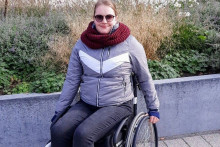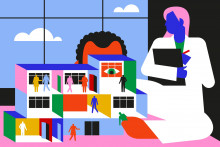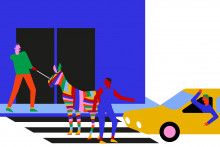As she also writes in her letter, Anouk Noordeloos has chronic illnesses which limit her everyday life. Most of the time, she needs to rely on a wheelchair to move around. ‘When I started at the UT about five years ago, I wasn’t as disabled as I am now. Nowadays I need to use a wheelchair and I have noticed that access to the university has become increasingly difficult for me. I’m not the only person with disability to ever be at the UT, and so I really wanted to do something about this.’
‘It has been difficult to find someone to help me fix these problems’
Anouk has reached out to various departments at the UT, but hasn’t been able to achieve any results so far. ‘It has been difficult to find someone to help me fix these problems,’ she says. ‘I have talked to the disability office, for example. They would love to help me, but they don’t have the power to make structural changes. That is why I decided to write directly to the Executive Board. The letter was written by me and co-signed by classmates who support the message.’
Lack of accessible bathrooms
In the letter, Anouk describes multiple issues that she and other students have encountered. ‘I have experienced many issues in accessibility into buildings, as well as inside buildings. For instance, there is a lack of accessible bathrooms. There isn’t a single restroom I can use in the Horst Tower. It is very difficult if I have a lecture there, because to use a toilet I need to take the elevator down – which often takes forever, because everyone uses the elevator there – and find a bathroom on the ground floor of Horst. This means it can easily take me half an hour to go to the toilet.’
Only physical exams and classes
‘I also wanted to point out certain corona measures,’ continues the student. ‘Some courses only offer physical exams. There is no online alternative. That is completely inconsiderate to the chronically ill students in the high risk group for corona. I’m part of this group and I have to stay home. It is not an option for me to sit in a room with hundred other people, especially since many students will show up even if they have symptoms, because they don’t want to miss the exam.’
In fact, it was the corona crisis that prompted Anouk to send the letter. ‘Before corona, if you didn’t come to lectures, you had no alternative. You’d miss out on education. But many teachers don’t understand that some students can’t come – not out of laziness, they just physically can’t. Now education is online which makes it easier for me, but I keep hearing that we should go back to in-person lectures only. I say: no, we shouldn’t go back, we should go forward.’
‘We shouldn’t go back, we should go forward’
Anouk mentions that she even had to drop courses that offered only in-person exams and/or lessons. ‘Why isn’t it possible to have both physical and recorded lectures?’ she asks. ‘Instead of focusing on going back to how it was, we should make online education better, record all lectures, so that everyone has access to them. Everyone deserves the right to access their study materials – and not only disabled students, but also students who might just be sick that week. We switched to online teaching, so it shouldn’t be a problem to have recorded lectures online, but it seems to be. That is why I decided to act now.’
More awareness, no ‘special needs’
‘When people talk of disabilities, they often mention “special needs”. But we don’t have extraordinary needs, we need the same as everyone else. Everybody needs access to education. Everybody needs to be able to enter a building. That is not special,’ says Anouk. ‘That is why I also mention attitude and language use in my letter. We could use more awareness about disabilities on campus, because people often don’t know how to act around disabled students.’
‘Things are made for us, but not with us’
Anouk Noordeloos has sent the letter today, and so the UT has naturally not had time to react yet. The student hopes that the board will contact her and include disabled people in finding the solutions. ‘Often things are made for us, but not with us,’ she points out. ‘I don’t expect things to be changed tomorrow, but we need to get moving. Otherwise it will never happen.’ And as Anouk concludes in her letter: ‘We can work together to improve this university so every student can reach their full potential and feel welcome here, because diversity is beautiful.’







